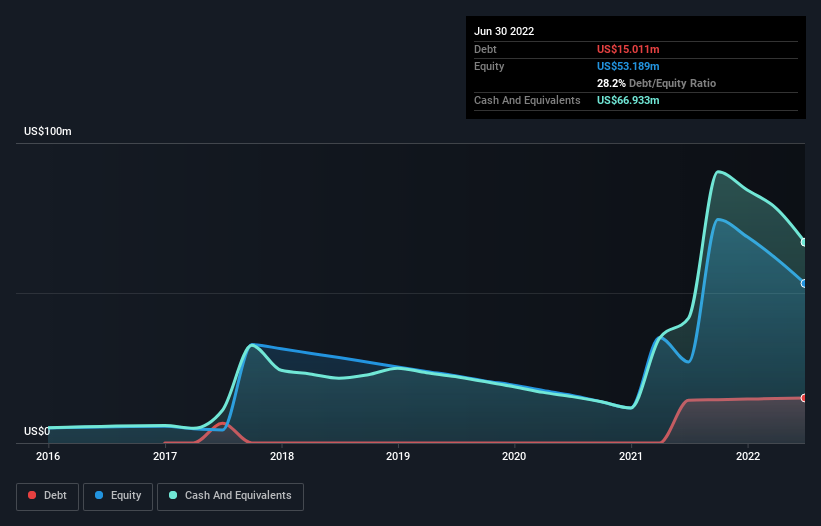The external fund manager backed by Berkshire Hathaway's Charlie Munger, Li Lu, makes no bones about it when he says 'The biggest investment risk is not the volatility of prices, but whether you will suffer a permanent loss of capital.' So it might be obvious that you need to consider debt, when you think about how risky any given stock is, because too much debt can sink a company. We note that Celcuity Inc. (NASDAQ:CELC) does have debt on its balance sheet. But the real question is whether this debt is making the company risky.
When Is Debt Dangerous?
Debt assists a business until the business has trouble paying it off, either with new capital or with free cash flow. Ultimately, if the company can't fulfill its legal obligations to repay debt, shareholders could walk away with nothing. While that is not too common, we often do see indebted companies permanently diluting shareholders because lenders force them to raise capital at a distressed price. Of course, the upside of debt is that it often represents cheap capital, especially when it replaces dilution in a company with the ability to reinvest at high rates of return. The first step when considering a company's debt levels is to consider its cash and debt together.
See our latest analysis for Celcuity
What Is Celcuity's Debt?
The image below, which you can click on for greater detail, shows that at June 2022 Celcuity had debt of US$15.0m, up from US$14.2m in one year. However, it does have US$66.9m in cash offsetting this, leading to net cash of US$51.9m.

A Look At Celcuity's Liabilities
The latest balance sheet data shows that Celcuity had liabilities of US$4.15m due within a year, and liabilities of US$15.0m falling due after that. Offsetting this, it had US$66.9m in cash and US$95.3k in receivables that were due within 12 months. So it can boast US$47.9m more liquid assets than total liabilities.
This surplus strongly suggests that Celcuity has a rock-solid balance sheet (and the debt is of no concern whatsoever). With this in mind one could posit that its balance sheet means the company is able to handle some adversity. Simply put, the fact that Celcuity has more cash than debt is arguably a good indication that it can manage its debt safely. The balance sheet is clearly the area to focus on when you are analysing debt. But ultimately the future profitability of the business will decide if Celcuity can strengthen its balance sheet over time. So if you're focused on the future you can check out this free report showing analyst profit forecasts.
Given its lack of meaningful operating revenue, Celcuity shareholders no doubt hope it can fund itself until it has a profitable product.
So How Risky Is Celcuity?
By their very nature companies that are losing money are more risky than those with a long history of profitability. And in the last year Celcuity had an earnings before interest and tax (EBIT) loss, truth be told. Indeed, in that time it burnt through US$27m of cash and made a loss of US$31m. However, it has net cash of US$51.9m, so it has a bit of time before it will need more capital. Even though its balance sheet seems sufficiently liquid, debt always makes us a little nervous if a company doesn't produce free cash flow regularly. When analysing debt levels, the balance sheet is the obvious place to start. But ultimately, every company can contain risks that exist outside of the balance sheet. To that end, you should learn about the 3 warning signs we've spotted with Celcuity (including 2 which are a bit unpleasant) .
If, after all that, you're more interested in a fast growing company with a rock-solid balance sheet, then check out our list of net cash growth stocks without delay.
New: AI Stock Screener & Alerts
Our new AI Stock Screener scans the market every day to uncover opportunities.
• Dividend Powerhouses (3%+ Yield)
• Undervalued Small Caps with Insider Buying
• High growth Tech and AI Companies
Or build your own from over 50 metrics.
Have feedback on this article? Concerned about the content? Get in touch with us directly. Alternatively, email editorial-team (at) simplywallst.com.
This article by Simply Wall St is general in nature. We provide commentary based on historical data and analyst forecasts only using an unbiased methodology and our articles are not intended to be financial advice. It does not constitute a recommendation to buy or sell any stock, and does not take account of your objectives, or your financial situation. We aim to bring you long-term focused analysis driven by fundamental data. Note that our analysis may not factor in the latest price-sensitive company announcements or qualitative material. Simply Wall St has no position in any stocks mentioned.
About NasdaqCM:CELC
Celcuity
A clinical-stage biotechnology company, focuses on the development of targeted therapies for the treatment of various solid tumors in the United States.
High growth potential with adequate balance sheet.
Market Insights
Community Narratives



